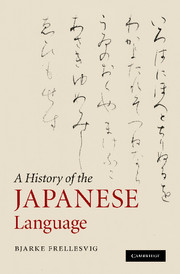Book contents
- Frontmatter
- Contents
- List of tables, maps and figures
- Acknowledgements
- List of abbreviations
- Introduction
- Part I Old Japanese
- 1 Early writing in Japan and Old Japanese sources
- 2 Phonology
- 3 Grammar
- 4 Loanwords
- 5 Eastern Old Japanese
- Part II Early Middle Japanese
- Part III Late Middle Japanese
- Part IV Modern Japanese
- Appendix: Summary of the main regular phonemic changes between Old Japanese and conservative Modern Japanese
- References
- Index of main grammatical forms
- General index
4 - Loanwords
Published online by Cambridge University Press: 03 May 2011
- Frontmatter
- Contents
- List of tables, maps and figures
- Acknowledgements
- List of abbreviations
- Introduction
- Part I Old Japanese
- 1 Early writing in Japan and Old Japanese sources
- 2 Phonology
- 3 Grammar
- 4 Loanwords
- 5 Eastern Old Japanese
- Part II Early Middle Japanese
- Part III Late Middle Japanese
- Part IV Modern Japanese
- Appendix: Summary of the main regular phonemic changes between Old Japanese and conservative Modern Japanese
- References
- Index of main grammatical forms
- General index
Summary
The etymological study of the lexicon of OJ, the question of its provenance, and the sorting of inherited from borrowed wordstock are part of the issue of the genetic affiliation of Japanese: OJ words which are similar to, or take part in sets of sound correspondences with, words from another language may be cognate with these words; they may be borrowings from the other language; they may themselves be the source of borrowings into the other language; or the similarities may simply be due to chance. We are more fortunate for the later historical stages of Japanese, but for the OJ language as it presents itself to us, we simply very often do not know and many attempts to identify old loanwords within OJ are highly speculative.
It is beyond doubt that OJ includes old loanwords from the languages around Japan – especially words relating to agriculture, seafaring, warfare, spiritual and religious life, government, and administration – but that we will not be able to identify many of them as loanwords on other than extra-linguistic grounds. It is for example a strong hypothesis that OJ iraka ‘roof, roof tile’ is a loanword, but we do not know from where. In other cases we believe that a word must be borrowed and can come up with several likely sources but cannot choose between them. It is, for example, very likely that the Japanese word for ‘horse’, OJ uma, is borrowed and there are indeed words in surrounding languages which mean ‘horse’ and which are similar to uma, e.g. EMC ✻maɨ’, MK mol, Mongolian morin.
- Type
- Chapter
- Information
- A History of the Japanese Language , pp. 144 - 150Publisher: Cambridge University PressPrint publication year: 2010



